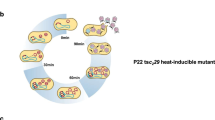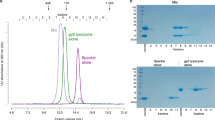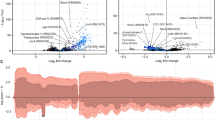Abstract
THREE distinct classes of phage-specific proteins—“pre-early”, “early” and “late”—are synthesised in a temporal sequence after infection of Escherichia coli with bacteriophage T51 (Fig. 2a). The synthesis of pre-early proteins begins within the first minute after infection and is shut off 8–10 min later1,2. The beginning of synthesis of early proteins is delayed until about 6 min after infection. This delay is mechanical, and is a result of the transfer of phage DNA to the host cell in two steps1,3. The rate of synthesis of early proteins decreases considerably after 20 to 25 min of infection, but synthesis does continue through the late period at diminishing rates. We have observed that the rate of synthesis of most early proteins is diminished normally even when the turn-on of synthesis of late proteins is defective4. This observation suggested to us the presence of a negative control mechanism for the ‘shut-off’ of synthesis of early proteins, rather than a passive shut-off, such as a competition between early and late transcripts for the translational system of the infected cell. We have identified a gene the product of which is required for the shut-off of synthesis of phage specific early proteins, but which is also required for the replication of phage DNA.
This is a preview of subscription content, access via your institution
Access options
Subscribe to this journal
Receive 51 print issues and online access
$199.00 per year
only $3.90 per issue
Buy this article
- Purchase on Springer Link
- Instant access to full article PDF
Prices may be subject to local taxes which are calculated during checkout
Similar content being viewed by others
References
McCorquodale, D. J., and Buchanan, J. M., J. biol. Chem., 243, 2550 (1968).
McCorquodale, D. J., and Lanni, Y. T., J. molec. Biol., 48, 133 (1970).
Lanni, Y. T., Bact. Rev., 32, 227 (1968).
Chinnadurai, G., and McCorquodale, D. J., Proc. natn. Acad. Sci. U.S.A., 70, 3502 (1973).
Chinnadurai, G., and McCorquodale, D. J., J. Virol., 13, 85 (1974).
Beckman, L. D., Hoffman, M. S., and McCorquodale, D. J., J. molec. Biol., 62, 551 (1971).
Hendrickson, H. E., and McCorquodale, D. J., J. Virol., 7, 612 (1971).
Hendrickson, H. E., and McCorquodale, D. J., J. Virol., 9, 981 (1972).
Alberts, B. M., Amodio, F. J., Jenkins, M., Gutmann, E. D., and Ferris, F. L., Cold Spring Harbor Symp. quant. Biol., 33, 289 (1968).
Alberts, B. M., and Frey, L., Nature, 227, 1313 (1970).
Riva, S., Cascino, A., and Geiduschek, E. P., J. molec. Biol., 54, 85 (1970).
Reuben, R. C., and Gefter, M. L., Proc. natn. Acad. Sci. U.S.A., 70, 1846 (1973).
Author information
Authors and Affiliations
Rights and permissions
About this article
Cite this article
CHINNADURAI, G., McCORQUODALE, D. Dual Role of Gene D5 in the Development of Bacteriophage T5. Nature 247, 554–556 (1974). https://doi.org/10.1038/247554a0
Received:
Issue Date:
DOI: https://doi.org/10.1038/247554a0
This article is cited by
-
Physical mapping of the HindIII, EcoRI, Sal and Sma restriction endonuclease cleavage fragments from bacteriophage T5 DNA
Molecular and General Genetics MGG (1976)
Comments
By submitting a comment you agree to abide by our Terms and Community Guidelines. If you find something abusive or that does not comply with our terms or guidelines please flag it as inappropriate.



